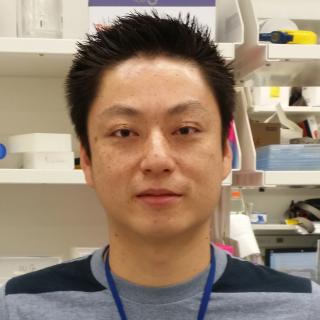
Dali Zong, Ph.D.
- Center for Cancer Research
- National Cancer Institute
- Building 37, Room 1108
- Bethesda, MD 20892
- 240-760-7623
- 240-541-4489
- dali.zong@nih.gov
RESEARCH SUMMARY
Dr. Zong has been a major contributor to the laboratory’s research efforts in understanding the mechanisms of DNA repair pathway choice. He has been responsible for conducting fundamental studies on the molecular mechanisms of DNA damage and repair processes and has developed a number of sophisticated assays - particularly imaging assays to further these studies. His current studies have implicated the role of ubiquitin-ligases such as RNF168 in the repair pathway and his results suggest that the deregulation of RNF168 activity could promote cancer predisposition in BRCA1 mutation carriers. Dr. Zong has shown that targeting of the chromatin ubiquitin pathway induces synthetic lethality in a subset of PARPi resistant BRCA1-deficient cancers. His work identifies RNF168 as a tractable target in the treatment of some types of breast cancers. This work was published in March of 2019 in Molecular Cell with Dr. Zong as the lead author.
More recently, Dr. Zong has uncovered an entirely novel role for 53BP1 – a protein thought to function largely as a barrier to DNA resection. In a study published recently in October of 2019 in Molecular Cell with Dr. Zong, as the lead author, he demonstrated that a 53BP1 mutant (S25A) functioned like a 53BP1 null and was, as expected, permissive for end resection and simultaneously rescued the lethality of BRCA1 null mice. However, this mutant surprisingly blocked loading of the RAD51 recombinase thereby uncovering a new role for 53BP1 in antagonizing homologous recombination (HR) at the post-resection step. This altogether unexpected observation has indeed challenged conventional paradigms and highlighted the complexities associated with DNA repair pathway choice.